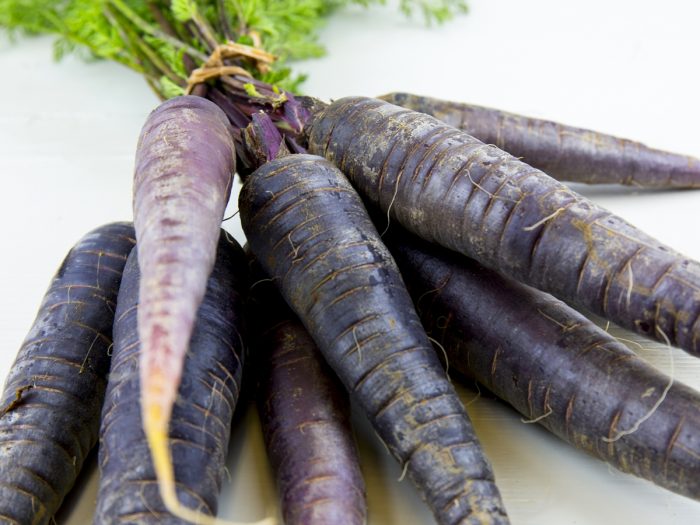Many people may have never seen or eaten a black carrot, but this carrot variety is quite common in other parts of the world such as Asian countries, and is a healthy addition to any diet.
What is a Black Carrot?
A black carrot is one color cultivar of the carrot, scientifically known as Daucus carota subsp. sativus, and is most commonly found in China and India. Carrots may traditionally be orange in America and other parts of the world, but carrots can come in many colors, including red, purple, white, yellow, and black. The variation in color is primarily due to the concentration of compounds found in the various types. The dark color of the purple and black varieties signals a high concentration of anthocyanins, whereas orange and yellow carrots tend to be higher in beta-carotene and other active ingredients. [1]
Black carrots have a unique taste, decidedly different than white or orange carrots. Black carrots have an unexpected sweetness to them, as well as a subtle spicy aftertaste. Although these carrots are black on the outside, many of them will be paler in color in the center. Black carrots are most commonly available in the East, where they are grown, but in specialty and import stores you can still find these uniquely colored vegetables. Black carrot extract is also widely used for its health properties.
Health Benefits of Black Carrot
Black carrots, being nutrient-rich, get their color from anthocyanins and have some important health benefits which may include their possible ability to treat neurodegenerative diseases, boost cognition, reduce inflammation, optimize digestion among others.
May Treat Rheumatoid Arthritis
Some of the active ingredients in black carrots have anti-inflammatory properties, as well as antioxidant abilities, which can help to slow down chronic diseases and oxidative stress, such as what causes rheumatoid arthritis. [2]
May Aid in Digestion
Carrots are extremely high in dietary fiber, which is essential for a healthy digestive system. Fiber can help to stimulate peristaltic motion and improve nutrient uptake in the gut. Furthermore, fiber can help to lower cholesterol levels and regulate the release of insulin and glucose in the body, which is good news for diabetics. [3]

Cut black carrots in cubes and add them to salads. Photo Credit: Shutterstock
May Have Neuroprotective Properties
The antioxidants that may be present in black carrots are known to reduce the beta-amyloid plaque deposition in the brain, which can lead to neural congestion and neurodegenerative diseases. [4]
May Improve Vision
Carrots have long been famed for their beta-carotene supply, which is known to directly protect vision health. Functioning as an antioxidant, beta-carotene can be able to lower your risk of macular degeneration and slow the development of cataracts, helping you see better for longer! [5]
What is Black Carrot Used For?
Black carrots can be used in many of the same ways as a normal carrot. It is particularly good in crudites and for dipping, thanks to its sweet flavor. It can be steamed, or added to stews and soups, as well as curries and salads. These carrots are also very good for pickling, thanks to their inherent sweetness.
Black carrot extract also has a number of uses, including as a natural food coloring. Many people want to be kosher in their dietary habits, meaning that they avoid synthetic food colorings, so black carrot extract is useful in these situations. There are few natural sources of such a dark color, particularly when those extracts are also packed with antioxidants and other useful nutrients. This extract can be used to replace popular food colorings, such as FD&C Red 40.
Black Carrot Side Effects
Although there are a number of benefits, some side effects are possible after consuming black carrots, such as skin discoloration, allergic reactions, flatulence, and blood pressure issues. Most of these side effects come when an excessive amount of these potentially high-fiber, high-potassium, high-beta-carotene vegetables are eaten. Consuming any food in excess can be dangerous, particularly for the health of your gastrointestinal system. That being said, some people do have a natural allergy to carrots, so all varieties should be avoided, to prevent swelling, rashes, and stomach issues.
